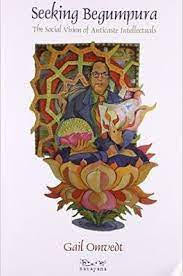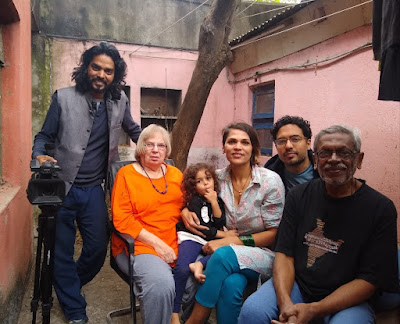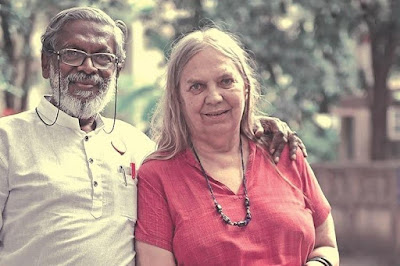Gail Omvedt (2nd of August 1941 – 25th August 2021) was an Indian sociologist and human rights activist who was born in the United States.
She was a prolific writer who authored many books about India's anti-caste movement, Dalit politics, and women's issues.
- Omvedt was active in anti-caste and Dalit movements, as well as environmental, farmers', and women's movements, particularly among rural women.
- Cultural Revolt in a Colonial Society: The Non-Brahman Movement in Western India, - was the title of Omvedt's dissertation.
- Numerous books and essays on class, caste, and gender problems are among Omvedt's scholarly writings.
- She worked as a consultant for FAO, UNDP, and NOVIB, as well as a Dr Ambedkar Chair Professor at NISWASS in Orissa, a professor of sociology at the University of Pune, and an Asian guest professor at Copenhagen's Nordic Institute of Asian Studies.
- She was the research director of the Krantivir Trust and a senior fellow at the Nehru Memorial Museum and Library.
Gail Omvedt was born in Minneapolis and received her bachelor's and master's degrees in sociology from Carleton College and UC Berkeley, respectively.
- She has been a citizen of India since 1983.
- She and her husband, Bharat Patankar, resided in Kasegaon, Maharashtra, with their mother-in-law, Indumati Patankar, and relatives.
- She worked as a consultant sociologist on gender, environment, and rural development for the United Nations Development Programme (UNDP), Oxfam Novib (NOVIB), and other organizations in the years leading up to her death.
- She worked as a consultant for UN agencies and NGOs, as well as a Professor of Sociology at the University of Pune, an Asian Guest Professor at the Nordic Institute of Asian Studies in Copenhagen, and a Senior Fellow at the Nehru Memorial Museum and Library in New Delhi.
- She worked as a Visiting Professor and Coordinator at the University of Pune's School of Social Justice, as well as a Fellow at the Indian Institute of Advanced Study in Shimla.
- Dr. B.R. Ambedkar Chair of Social Change and Development at IGNOU has Gail Omvedt as a previous Chair Professor.
At the age of 80, Omvedt passed away in August, 2021. She is survived by her husband Dr. Bharat Patankar, daughter Prachi, son in law Tejaswi and grand daughter Nia who are settled in the United States.
- In India, Omvedt worked with social movements such as the Dalit and anti-caste movements, environmental movements, farmers' movements, and particularly rural women.
- Shramik Mukti Dal, Stri Mukti Sangarsh Chalval, which works on problems of abandoned women in the Sangli and Satara regions of southern Maharashtra, and the Shetkari Mahila Aghadi, which focuses on issues of women's land rights and political power, were both active in her community.
Omvedt was critical of Hinduism's holy texts (or what she referred to as "brahminism") for promoting a caste-based society, according to her.
- Omvedt criticized the Hindu practice of venerating the Vedas as sacred, in addition to criticizing their seeming support for the caste system.
- She expressed her views on the Rigveda in an open letter to then-BJP President Bangaru Laxman, which was published in The Hindu: The Vedas, particularly the Rg Veda, are magnificent literature.
- I can only speak from translations, but I'm happy the prohibition on women and shudras reading them has been lifted, and that excellent translations by women and shudras themselves are now accessible.
- But to treat them as though they were holy? Check them out for yourself.
- The majority of the songs are aimed at achieving victory in battle, cattle rustling, and love-making, among other things.
- They celebrate conquest; hymns about Indra and Vrtra sound suspiciously as if the Aryans were responsible for destroying dams built by the Indus valley people; despite archeologists' claims that there is no evidence of direct destruction by "Aryan invasion," the Rg Veda reveals enmity between the Aryans and those they called dasyus, panis, and the like.
Despite the prevalence of caste-based discrimination, Omvedt claims that Hindutva organizations promote an ethnic definition of Hinduism based on location, lineage, and history in order to build unity across different castes.
Omvedt agreed with Dalit activists who said during the World Conference Against Racism that caste discrimination is akin to racism in that disadvantaged groups are seen as "biologically inferior and socially harmful."
- She has called the United States a "racist country" and advocated for affirmative action; however, she has compared American affirmative action policies favorably to those of India, saying, "It is a sad commentary on the state of Indian industrialists' social consciousness that such discussions have begun in an organized way in the United States before they have been thought of in India itself."
- In terms of perceptions of "group performance" in the United States and India, Omvedt wrote: "Whereas the debate in the United States assumes an overall equal distribution of capacity among social groups, in India the assumption appears to be that the unequal showing of different caste groups on examinations, in education, and so on is a result of actual different capacities." She has backed large-dam projects and GMO crops on occasion.
Omvedt's academic writing includes numerous books and articles on class, caste and gender issues, most notably:
- Cultural Revolt in a Colonial Society: The NonBrahman Movement in Maharashtra (Scientific Socialist Education Trust, 1966)
- We Shall Smash This Prison: Indian Women in Struggle (1979)
- "We Will Smash This Prison!.: Indian Women in Struggle " (Zed, 1980)
- "Violence Against Women: New Movements And New Theories In India" (Kali for Women, 1991)
- Reinventing Revolution: New Social Movements in India (M.E. Sharpe, 1993)
- Gender and Technology: Emerging Asian Visions (1994)
- Dalits And The Democratic Revolution: Dr. Ambedkar And The Dalit Movement In Colonial India (Sage India, 1994)
- Dalit Visions: the Anticaste movement and Indian Cultural Identity (Orient Longman, 1995)
- Growing Up Untouchable: A Dalit Autobiography (Rowman and Littlefield, 2000)
- Buddhism in India : Challenging Brahmanism and Caste (SageIndia, 2003
- "Ambedkar: Towards an Enlightened India " (Penguin, 2005)
- Seeking Begumpura: The Social Vision of Anticaste Intellectuals (New Delhi, Navayana, 2009)
- "Understanding Caste: From Buddha To Ambedkar And Beyond" (New Delhi: Orient Blackswan, 2011)
- Songs of Tukoba with Bharat Patankar she has published (translations) (Manohar, 2012)
- Jotirao Phule and the Ideology of Social Revolution in India.
Awards And Recognition:
- Matoshree Bhimabai Ambedkar Award (2012)
- BA received Magna Cum Laude, with Distinction in Senior Comprehensive Examinations
- PhD qualifying examinations passed with Distinction
- Honorary Woodrow Wilson Fellowship, 1964–65
- Fulbright Fellowship as Tutor in English in India, June 1963-March 1964
- University of California Graduate Fellowships, 1964–65, 1965–66
- American Institute of Indian Studies, Junior Fellowship for PhD research in India on “The NonBrahman Movement in Maharashtra,” January–December 1971
- American Association of University Women, Fellowship for research on “Women’s Movement in India,” January–December 1975
- Savitribai Phule Puraskar, Padmashri Kavivarya Narayan Surve Sarvajanik Vacanalay, Nashik, 2002
- Dr. Ambedkar Chetna Award, Manavwadi Rachna Manch Punjab, August 2003
- ABP Majha Sanman Purskar, 2012
- Vitthal Ramji Shinde Award, April 2015
You may also want to read more about Hinduism here.
Be sure to check out my writings on religion here.












